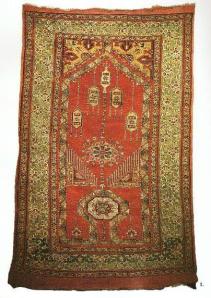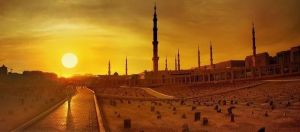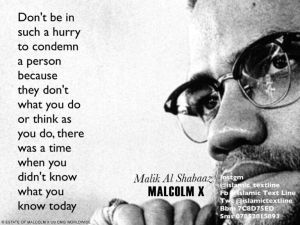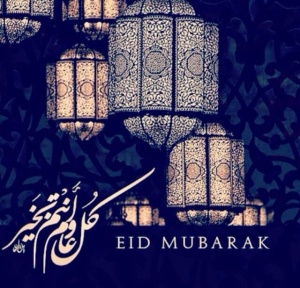Shaykh (Dr) Haitham al-Haddad, London, UK
When you sit down to reflect on what your vision is for your life, how do you know that the vision you’ve chosen is in fact the right one? Is it by the level of happiness you are convinced that your vision, if achieved, would give you? Or is it the fame and attention you know you’ll attain if you fulfilled it? It would be a shame if you spent years going up the ladder of life, only to find that the ladder was leaning against the wrong wall. Imagine if after all the effort you had exerted you found yourself on the Day of Judgment wishing you’d spent all that time and energy pursuing a different vision on Earth, one that would have given you a higher status in the hereafter which, after all, will last forever.On the Day of Judgment, things will become very clear to us in the starkest of ways. We will see reality as it truly is and realize how short was the opportunity that we had on Earth as the following hadith clearly illustrates:
Anas ibn Malik narrates that the messenger of Allah (peace and blessings of Allah be upon him) said, “The most affluent of the people in this world, of those who will go to Hell, will be brought on the Day of Resurrection and dipped once in the Fire. Then it will be said: O son of Adam, did you ever see anything good? Did you ever have any pleasure? He will say: No, by Allah, O Lord. Then the most destitute of the people in this world, of those who will enter Paradise, will be brought and dipped once in Paradise, and it will be said to him: O son of Adam, did you ever see anything bad? Did you ever experience any hardship? He will say: No, by Allah, O Lord. I never saw anything bad and I never experienced any hardship.”[1]
Imagine how such a wealthy man will feel about his supposedly successful life on Earth. What once seemed like the ultimate achievement for a human being will seem like a wasted opportunity. As the hadith shows us, any achievement in this life is worthless if it does not lead to success in the hereafter. Allah confirms this, in His saying:
“Everyone shall taste death. And only on the Day of Resurrection shall you be paid your wages in full. And whoever is removed away from the Fire and admitted to Paradise, he indeed is successful. The life of this world is only the enjoyment of deception (a deceiving thing).”[2]
Therefore when we talk about having a vision for our lives, the vision should be one that leads us to maximum achievement in the Hereafter. It was reported by Mu’adh ibn Jabal that the Prophet (peace be upon him) said, “The People of Paradise will not regret anything except one thing alone: the hour that passed them by and in which they made no remembrance of Allah.”[3] So turning to the specific question of the ideal vision for Muslim women, we have to approach the discussion with a Hereafter-centred worldview.
Although it is praiseworthy that many Muslim women think about how best to spend their lives, it is unfortunate that many Muslim women in the West have been heavily influenced by a Western materialistic understanding of life, values and the status of women. Ironically, increasing numbers of Western non-Muslim women have begun to realise the importance and value of their role in the home and reject the notion of a woman’s worth being defined by her career, even campaigning for the right of women to stay at home.[4]
It seems that some of our Muslim sisters have bought into the career-oriented model of Muslim womanhood. They speak about empowering Muslim women to become successful businesswomen, company directors, financial advisors, police officers, members of Parliament and even actors, singers and dancers as if this is something Islam has endorsed.
To add to their delusion, we find Muslim preachers or activists who promote such ideas without understanding the Qur’anic vision for women properly. We rarely hear them referring to the empowerment of Muslim women by means of being devoted wives and outstanding mothers. Despite the countless studies and research that has been conducted into the breakdown of society in general and the family unit in particular, all of which demonstrate that Western notions of female success have played a significant role in that breakdown, many Muslim women aspire to the very lifestyle that the West is now suffering the consequences of and recoiling from.
What is the noblest Islamic achievement for a Muslim woman?
I am sure that you may have come across various conflicting answers to this question, but instead of opting for what may feel right, we must identify the appropriate tools that enable us to identify what the shari’ah says, since it is the way of life given to us by our All-Wise Creator. I have been analysing the attitude of scripture towards the role of women for some time. We find that there a number of women mentioned in the Qur’an from amongst the believers and the disbelievers. Among the females mentioned in the Qur’an two of the noblest have been presented as role models for all Believers. Allah says,
“And Allah has set forth an example for those who believe, the wife of Pharaoh, when she said: “My Lord! Build for me a home with You in Paradise, and save me from Pharaoh and his work, and save me from the people who are oppressors. And Maryam (Mary), the daughter of ‘Imran who guarded her chastity; and We breathed into her through Our spirit (Gabriel), and she testified to the truth of the words of her Lord and His Scriptures, and she was of the obedient.”[5]
The Prophet’s Companion Abu Musa Al-Ash’ari narrates that the Prophet (peace be upon him) described the status of these two women by saying, “Many amongst men attained perfection but amongst women none attained perfection except Maryam (Mary), the daughter of ‘Imran, and Asiya, the wife of Pharaoh. And the superiority of Aishah to other women is like the superiority of tharid (a dish) to other meals.”[6]
Let us reflect on these two verses and the qualities of these two outstanding and noble women. They were explicitly presented as role models for humanity with their foremost qualities highlighted with candour. The first role model was Asiya, the wife of Pharaoh who was one of the worst tyrants in history. Her most important quality is her distinguished connection with Allah and her fervent desire for the hereafter. She supplicated, “My Lord! Build for me a home with You in Paradise.” Her second core quality was rejecting Pharaoh, his actions and the wrong-doers. She was not taken by the splendour of this life that she could have easily attained as Pharoah’s queen. The second role model, Maryam, was primarily praised for guarding her chastity. Her second major quality was her submission to the will of Allah who tested her by causing her to become pregnant without marriage. She also believed in the reality of the word of Allah “be”, the outcome of the word, and was exceptionally obedient and submissive to Allah.
When the Qur’an mentions other women, it is very evident that in praising any believing woman it praises her for possessing similar qualities. If she is a married woman the Qur’an would praise her as a wife, supporting her husband and being dutiful to him. If she is a mother, the Qur’an would praise her for her important role as a nurturer of the next generation. I have not witnessed the Qur’an praising any woman for her contribution outside of this framework. For example, we don’t see the Qur’an praising a woman for her political involvement, da’wah activism, level of knowledge, social engagement or even leadership. This article cannot possibly include the stories of all women mentioned in the Qur’an, but a simple analysis should confirm this finding.
The wife of Imran mentioned in Surah ‘Aal ‘Imran is another example of an exemplary woman. She was a wife and a mother. The main quality mentioned in Qur’an about her is what is mentioned in the verse,
“(Remember) when the wife of ‘Imran said, “O my Lord! I have vowed to you what is in my womb to be dedicated for your service, so accept this from me. Verily, you are the All-Hearer, the All-Knowing.”[7]
According to the exegete Ibn Kathir, the wife of ‘Imran mentioned here is the mother of Maryam, and her name was Hannah bint Faqudh. Muhammad bin Ishaq, the famous biographer and historian, mentioned that Hannah could not have children and that one day, she saw a bird feeding its chick. She wished she could have children and supplicated to Allah to grant her offspring. Allah accepted her supplication and she became pregnant. She vowed to make her child concentrate on worship and serving Bayt Al-Maqdis (the Masjid in Jerusalem). She did not know then if she would give birth to a male or a female child. The fact that this is the only thing mentioned about her indicates that this is the most important contribution that distinguished her and placed her in this praiseworthy position. It is evident from the story that her goal was to be a mother and when she knew that this was likely to happen she vowed to dedicate her child to serve Allah’s cause in order to thank Him for what he had given her. Similarly, Maryam’s chief contribution was her giving birth to a great Prophet and then taking care of him. The same may be said about the contribution of Musa’s mother. Their role in the lives and achievements of these great men was indispensable.
In this vein, a person might ask himself, why was it that Allah sent male Prophets and not female? He says, “And We sent not before you (as Messengers) any but men.”[8] It is noteworthy that Allah sent over a hundred thousand Prophets, three hundred and fifteen of them messengers[9] and all of them were men.
If we survey the sunnah of the Prophet (peace be upon him), a similar understanding is found. The qualities of devotion to Allah and their families were at the centre of the praiseworthy qualities of women. For example, the Prophet clarifies the Islamic view regarding the best women and the central reason behind it saying, “The best women from the riders of the camels (the best Arab women) are the righteous among the women of Quraish. They are the kindest women to their children in childhood and the most careful of women in regards to the property of their husbands.”[10] In this hadith the Prophet explains their goodness by being good wives and good mothers.
In another statement the Prophet explains that one of the main aims of marriage is to produce and nurture children who follow the Sunnah of the Prophet (peace be upon him) in worshiping Allah and glorifying him. The companion Ma’qil ibn Yasaar narrated that a man came to the messenger of Allah (peace and blessings of Allah be upon him) and said: “O messenger of Allah, I have found a woman who is from a good family and is pretty, but she does not bear children – should I marry her?” He told him not to. Then he came to him a second time and said something similar and he told him not to marry her. Then he came to him a third time and said something similar and he (peace and blessings of Allah be upon him) said: “Marry the one who is loving and fertile, for I will be proud of your great numbers before the nations on the Day of Resurrection.”[11] Shaykh ‘Abd al-‘Azeem Abaadi said in his commentary of this hadith, ‘Marry the one who is loving means the one who loves her husband; and the one who is fertile is the one who bears a lot of children.”[12]
We also find in the following Prophetic statement narrated by Abu Hurairah and recorded by Ibn Hibbaan, “If a woman offers her five daily prayers, fasts her month (Ramadan), guards her chastity and obeys her husband, it will be said to her, “Enter Paradise from whichever of the gates of Paradise you wish.” If entering paradise is your ultimate aim, then this hadith is a summary of how you may attain that goal and consequently, should be part and parcel of any vision you formulate for a truly successful life.
It is true that there are a number of Qur’anic verses and Prophetic traditions that mention the contribution of women in military activities, their political participation and da’wah work, however an analysis of these incidents confirms that they were carried out as complementary activities to their principal role as wives or mothers. In fact, we can go so far as to say that we do not find an emphasis in the shari’ah on any role for a woman except her role as a mother, a wife or a righteous servant of Allah. For example, we find that the shari’ah considered jihad as one of the noblest activities for men but did not encourage women to take part in it despite the military contribution of a number of female Companions.
There is a very clear hadith that demonstrates the Islamic position concerning women participating in jihad. A’ishah narrated that she asked the Prophet, “O Messenger of Allah, do women have to engage in jihad? He said, “a jihad in which there is no fighting: Hajj and ‘Umrah.”[13] Scholars either disliked women taking part in progressive jihad or prohibited it. Similarly, a number of textual evidences praise a just male ruler. The vast majority of Muslim scholars were men and women throughout Islamic history were never of a significant number.
In conclusion, I posit that the best role, the most honorable and worthy role for a woman is striving to be a fine wife, a good mother, or both. This role does not only secure the best for a woman in the hereafter, but also fits perfectly with her natural disposition. In her study published by Centre for Policy Studies in 2009, Cristina Odone, former deputy editor of The New Statesman (1998-2004)concluded that “far from being committed to a career, the overwhelming majority of women would prefer to opt out of it. Instead of finding satisfaction in full-time work, most women realise themselves in their other roles as carers, partners, community members, and above all mothers”. Furthermore, McIntosh and Bauer concluded that working women are “often felt overwhelmed and unable to keep up with their job and family responsibilities”. They added that “the working mother felt she had two full time jobs.”[14]
The embracing of this role is a fundamental element for the stability of the family which is the cornerstone of a stable society. There are a number of studies that confirm that housewives are the preservers of society in general and in many cases they offer their families more as homemakers than the income they might bring in from a career does. Other studies confirm that that the overall economic status of society at large is better when the women of that society are focused on the upbringing of children and maintaining the integrity of their families. In the aforementioned study the author suggested that what is needed is “a profound cultural shift.” She adds that “the establishment should stop forcing women into a mould, and allow them instead to realise their ambitions. This means accepting and supporting a value system that is family-centred, not work centred; and rehabilitating free emotional services, from cooking family meals to volunteering at the school fair. We need to redirect our thinking about women’s needs, to create a society in which women are freed from unnecessarily destructive pressures, children thrive and all can feel comfortable with the roles they fulfil not just as workers, but as parents, partners and citizens.”
I ask our sisters in Islam to embrace their true role in society and reap the huge rewards that Allah has in store for them for fulfilling this role. I ask our brothers to support them in fulfilling this role. When we define a vision for our lives, we are seeking to make a contribution and leave a legacy. Your legacy, sisters is that if you take on the role that Allah has ordained for you, then you will positively affect the future of the Muslim ummah and ultimately the future of the world. That is a legacy beyond measure.
In part two we will look at the role Muslim women can play if they are not yet married.
Notes: This is the first article in this series
Sources: www.islam21c.com
Islam21c requests all the readers of this article, and others, to share it on your facebook, twitter, and other platforms to further spread our efforts.
[1] Sahih Muslim
[2] 3:185
[3] Al-Bayhaqi in Shu`ab al-Imaan and al-Tabarani
[4] See: http://www.mothersathomematter.org/
[5] 66:11-12
[6] Sahih Al-Bukhari
[7] 3:35
[8] Al Quran 12:109
[9] The number was mentioned in a few prophetic statements recorded by Imam Ahmad in his Musnad and ibn Hibban.
[10] Al-Bukhari and Muslim and reported by Abu Hurairah
[11] Abu Dawood and al-Nasaa’i
[12] ‘Awn al-Ma’bood (6/33)
[13] Al-Bukhari and Muslim
[14] A thesis presented in partial fulfilment of the requirements for an MEd in the graduate school of Marietta College titled, “Working Mothers Vs Stay At Home Mothers: The Impact on Children.”



 “I have been blessed to visit the Holy City of Mecca, I have made my seven circuits around the Ka’ba, led by a young Mutawaf named Muhammad, I drank water from the well of the Zam Zam. I ran seven times back and forth between the hills of Mt. Al-Safa and Al Marwah. I have prayed in the ancient city of Mina, and I have prayed on Mt. Arafat.” “There were tens of thousands of pilgrims, from all over the world. They were of all colors, from blue-eyed blondes to black-skinned Africans. But we were all participating in the same ritual, displaying a spirit of unity and brotherhood that my experiences in America had led me to believe never could exist between the white and non-white.”
“I have been blessed to visit the Holy City of Mecca, I have made my seven circuits around the Ka’ba, led by a young Mutawaf named Muhammad, I drank water from the well of the Zam Zam. I ran seven times back and forth between the hills of Mt. Al-Safa and Al Marwah. I have prayed in the ancient city of Mina, and I have prayed on Mt. Arafat.” “There were tens of thousands of pilgrims, from all over the world. They were of all colors, from blue-eyed blondes to black-skinned Africans. But we were all participating in the same ritual, displaying a spirit of unity and brotherhood that my experiences in America had led me to believe never could exist between the white and non-white.”






